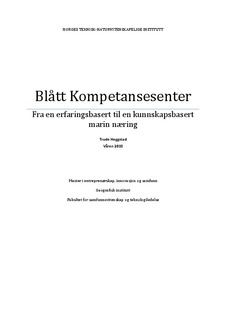| dc.description.abstract | The rapid development of the marine industry in the central regions of Norway from the
1980s and onwards, led to a new demand for competence, formalisation of knowledge and innovation in the industry. On the coast of Sør-Trøndelag, this led to the formation of Frøya Sixth Form College and Frøya og Hitra Resource center, who took on the role as central community developers at an early stage. Around year 2000, Frøya Sixth Form College experienced a decline in applicant numbers for their marine programs, and measures were needed to maintain them. The local marine industry took action by initiating collaboration with the school, in order to ensure a relevant, up to date marine education. These collaborations have since expanded to include research institutions and institutions of higher education. This has resulted in a complex community of knowledge exchange and knowledge accumulation. In order to develop this community further, the idea of a separate institution aimed at competence development and innovation was formed. Developing a center of competence could help the community reach its full potential. This was thought to function both as a physical center of competence, but also as a regional innovation system in order to lift the competence development and innovation rate in the regional marine agglomeration
The aim of this thesis is to analyze the different aspects of Blått Kompetansesenter (Blue Center of Competence) in order to answer some of the most central questions regarding the formation of the center. These are questions raised by the project team during the process of developing the concept, and evolve around the main questions of why Blått Kompetansesenter is formed, and how it should be organized. This includes political aspects of regional development, and theories of knowledge accumulation. As a local initiative for regional development, bottom up/top down perspectives, and considering endogenous approaches to regional development have been central focus points. Problematizing challenges related to knowledge accumulation and the needs for diversification in the industry in order to prevent lock-in situations are central to these aspects of the center.
In order to analyze the how aspect, an analysis of the different perspectives on agglomerations, and how to facilitate them as regional innovation systems has been central. The practical organization of the center is also a subject of the thesis, considering possible problems and solutions related to practical matters. In accordance with my action research based approach, the conclusion of the thesis is a formal assessment of the project, in order to
point out my main findings. | nb_NO |
